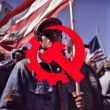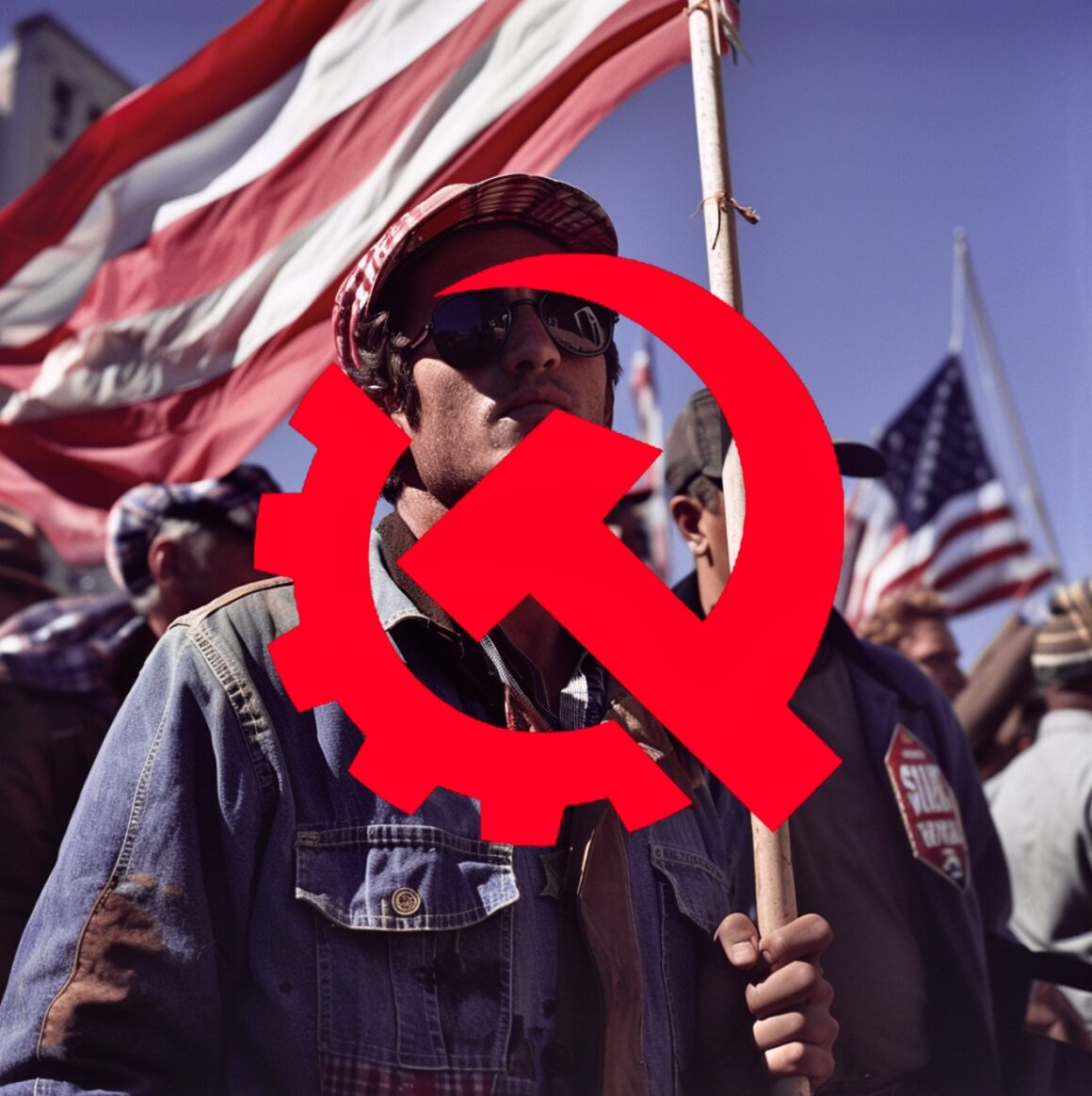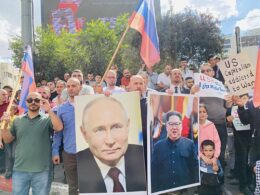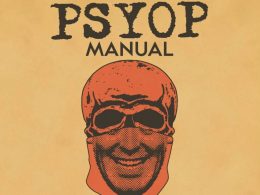We in the United States are on the trajectory towards building a communist organizational force that wins. We know we’re going in the right direction because more and more, this country is seeing the re-emergence of a type of communism that’s historically succeeded. This type can be described as “socialism with American characteristics,” where Marxists center their own conditions and advance their own people’s interests.
The way that the USA’s communist movement actually won the masses during the 20th century, rather than only winning over a niche, was by fulfilling the mandates which came from the masses. By looking at what the people’s needs were, and prioritizing the task of meeting those needs. In 1945–when the CPUSA had defeated Earl Browder’s dogma of tailing the Democratic Party—William Foster wrote about how this was taking communism in a triumphant direction: “The supreme measure of our new policy is its application in practice to the immediate demands and interests of the people. Only if we have successful practical mass policies and activities can we free ourselves from Browder’s revisionism, on the one hand, and avoid the pitfalls of ‘Left’ sectarianism, on the other.”
Foster’s faction had acclimated the party to the particular conditions of the society in which it operated; patriotism was an indispensable part of this, but even more important was the centering of the proletariat’s interests. That was how the Black Panther Party would build substantial power a generation later, and it’s how modern U.S. communist orgs like Uhuru are getting that success now. Over its decades of work, Uhuru has put together food programs, created businesses, and renovated buildings; because of this, it’s been able to earn a considerable amount of mass backing. The American Communist Party, which launched this summer, also deserves credit for the services it’s provided; its program to clean up garbage has contributed to the successes which ACP has so far had in winning over workers. This is the kind of work that causes regular people to see you as credible; that lets them start to become freer from the prejudices of anti-communist ideology. I’m not a member of ACP, but it’s something important to remark upon when talking about party-building in the United States.
As we aspire to build far greater ties with the masses, potentially the most important lesson for us to remember is that nothing must distract from that mission of fulfilling the people’s mandates. And there are no limits to the things that could distract us, so we constantly need to be vigilant for such pitfalls.
An example of when a communist party has been undone by having the wrong priorities, even though it’s nominally committed to rebuilding the old movement, is the PCUSA. Within a decade after Angelo D’Angelo started the Party of Communists USA in 2014, his project effectively fell apart. The bulk of its members left, and it lost major allies; allies like the Center for Political Innovation, the org that I’m part of. The catalyst for this collapse was when PCUSA got taken over by a group of labor Zionists, who got the party to take the position that a Jewish state in Palestine should exist. This was distinct from the tactical position Hamas takes, which is that a two-state solution must come about as a prerequisite for Zionism then being fully dismantled.
PCUSA had joined in on liberal Zionist efforts to gatekeep the pro-Palestine movement, which nobody in the org who had integrity could forgive; so most of the people who originally were with Angelo walked away. This Zionist shift was not where the problem started, though. It started when Angelo, who himself promoted the “Israel should be maintained” argument, designed the party in a fashion that lacked mass connections or solid organizational structure.
The PCUSA is worth studying as an example because though it was never big, it sold itself as an alternative to the insular leftism which dominates today’s “communist” politics; Angelo convinced many that he would re-create the successes of the past. The party talked about the problem of petty-bourgeois radicalism, where organizers exclusively focus on the students and the professional managerial class while ignoring the broader masses; for this reason, it looked like an answer to the idealism of the PSL and the modern CPUSA. It also took correct positions that almost nobody else had the courage to take, like supporting Russia’s anti-fascist war. The flaw that undid the party, as former PCUSA member George Gruenthal recently told me, was that “opportunism” drove Angelo. That’s the word Gruenthal used.
According to Gruenthal, right when Angelo started the PCUSA it was apparent that he didn’t think building a substantial structure was essential to being a communist party. Angelo wanted to call it a party right from the beginning, despite Gruenthal’s objection that you can’t claim this title unless you’ve already established a serious on-the-ground presence. ACP actually began with that presence; PCUSA did not.
The outcome of this presumptuous thinking was that the PCUSA kept creating groups which it called mass orgs, but which existed essentially all on paper. The leadership didn’t think it mattered that numerous PCUSA members didn’t know any other members in their own cities; it was satisfied with simply getting enough members to fill Zoom meetings. Because the PCUSA sold itself as a solution to petty-bourgeois radicalism, it attracted many serious people, but these people were left to try to build local cadres on their own without any help from the leadership.
The ideological rationale for Angelo’s opportunism was that as long as the PCUSA could do adequate educational work, and spread the idea of communism, then that would be enough. As Gruenthal also told me, Angelo’s goal was in essence “to rebuild the Soviet Union”; which sounds quite strange, since the PCUSA is in the United States. But it’s apparent that this was indeed Angelo’s vision, because he merely utilized Soviet aesthetics while neglecting to “build something in this country” as Gruenthal said he wished PCUSA did. Because Angelo thought it was enough to simply retread 20th century socialism, he uncritically repeated the pro-Zionist stance which the USSR and the CPUSA held in 1948. And that was when PCUSA’s serious members could no longer stay.
Angelo assumed that because the old CPUSA succeeded, the way for us to succeed now must be by replicating every part of the old CPUSA’s ideology, both good and bad. Which the PCUSA didn’t even truly do, because it didn’t implement Foster’s idea of acting in attunement with the people’s needs. From this failure, though, is emerging a series of projects that are bringing us closer to victory. Many of the people who left PCUSA immediately went into ACP, and brought with them the lessons from their experiences. It’s because of these mistakes our movement made in the past that we now have such a clear understanding about how to proceed.
At this moment, bad-faith actors are trying to divert communists like us away from what’s important; to bait us with their smears about “rightism,” and make us take on a perpetually reactive role. Lenin and Stalin were targeted with the exact same false accusations that these actors are employing now. And Stalin concluded that beyond the necessary efforts to defend oneself, the way to respond to such attacks is by staying on the correct path:
At the All-Russian Party Conference in 1908, when Lenin fought the Russian “ultra-Lefts” and utterly routed them, in our midst, too, there were people who accused Lenin of Rightism, of having swung to the Right. But all the world now knows that Lenin’s position at that time was correct, that his standpoint was the only revolutionary one, and that the Russian “ultra-Lefts,” who were then making a show of “revolutionary” phrases, were in reality opportunists. It should not be forgotten that Rights and “ultra-Lefts” are actually twins, that consequently both take an opportunist stand, the difference between them being that whereas the Rights do not always conceal their opportunism, the Lefts invariably camouflage their opportunism with “revolutionary” phrases. We cannot allow our policy to be determined by what scandal mongers and philistines may say about us. We must go our way firmly and confidently, paying no heed to the tales idle minds may invent about us. The Russians have an apt saying: “the dogs bark, the caravan passes.” We should bear this saying in mind; it may stand us in good stead on more than one occasion.
This latest ultra-left scandal-mongering is about trying to make us unfocused, and therefore unprepared, as the state gets ready to crush us. The effort to purge anti-imperialists is speeding up exponentially; all that our enemies need is another January 6 moment, and the pretext will exist for many more raids and arrests. We urgently need to build the inner organizational mechanisms that can let dissident groups survive repression. We must expand our connections within the unions, which will let us continue with mass work in a scenario where we have to go underground. We are in place to do these things; if we follow Stalin’s advice about not letting disruptors define our actions, the state won’t be able to stop us.
————————————————————————
If you appreciate my work, I hope you become a one-time or regular donor to my Patreon account. Like most of us, I’m feeling the economic pressures amid late-stage capitalism, and I need money to keep fighting for a new system that works for all of us. Go to my Patreon here.
To keep this platform effective amid the censorship against dissenting voices, join my Telegram channel.








